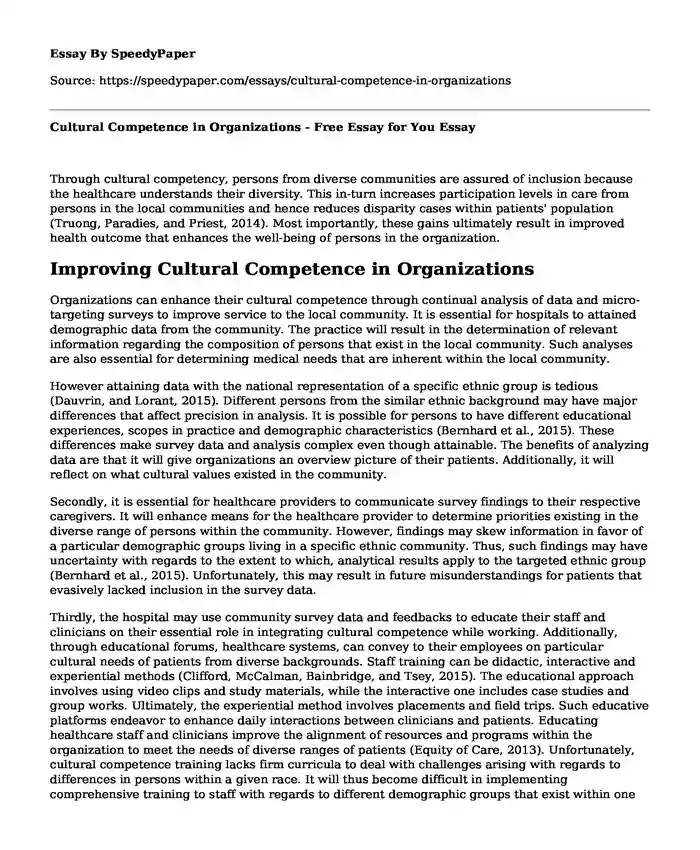
| Type of paper: | Essay |
| Categories: | Multiculturalism Organizational culture |
| Pages: | 3 |
| Wordcount: | 773 words |
Through cultural competency, persons from diverse communities are assured of inclusion because the healthcare understands their diversity. This in-turn increases participation levels in care from persons in the local communities and hence reduces disparity cases within patients' population (Truong, Paradies, and Priest, 2014). Most importantly, these gains ultimately result in improved health outcome that enhances the well-being of persons in the organization.
Improving Cultural Competence in Organizations
Organizations can enhance their cultural competence through continual analysis of data and micro-targeting surveys to improve service to the local community. It is essential for hospitals to attained demographic data from the community. The practice will result in the determination of relevant information regarding the composition of persons that exist in the local community. Such analyses are also essential for determining medical needs that are inherent within the local community.
However attaining data with the national representation of a specific ethnic group is tedious (Dauvrin, and Lorant, 2015). Different persons from the similar ethnic background may have major differences that affect precision in analysis. It is possible for persons to have different educational experiences, scopes in practice and demographic characteristics (Bernhard et al., 2015). These differences make survey data and analysis complex even though attainable. The benefits of analyzing data are that it will give organizations an overview picture of their patients. Additionally, it will reflect on what cultural values existed in the community.
Secondly, it is essential for healthcare providers to communicate survey findings to their respective caregivers. It will enhance means for the healthcare provider to determine priorities existing in the diverse range of persons within the community. However, findings may skew information in favor of a particular demographic groups living in a specific ethnic community. Thus, such findings may have uncertainty with regards to the extent to which, analytical results apply to the targeted ethnic group (Bernhard et al., 2015). Unfortunately, this may result in future misunderstandings for patients that evasively lacked inclusion in the survey data.
Thirdly, the hospital may use community survey data and feedbacks to educate their staff and clinicians on their essential role in integrating cultural competence while working. Additionally, through educational forums, healthcare systems, can convey to their employees on particular cultural needs of patients from diverse backgrounds. Staff training can be didactic, interactive and experiential methods (Clifford, McCalman, Bainbridge, and Tsey, 2015). The educational approach involves using video clips and study materials, while the interactive one includes case studies and group works. Ultimately, the experiential method involves placements and field trips. Such educative platforms endeavor to enhance daily interactions between clinicians and patients. Educating healthcare staff and clinicians improve the alignment of resources and programs within the organization to meet the needs of diverse ranges of patients (Equity of Care, 2013). Unfortunately, cultural competence training lacks firm curricula to deal with challenges arising with regards to differences in persons within a given race. It will thus become difficult in implementing comprehensive training to staff with regards to different demographic groups that exist within one ethnic group. Additionally, emotional and social skills developments take minor placing in medical curricula (Bernhard et al., 2015). However, such skills are essential for handling patients from marginalized communities in an effective manner with the intention of assuring equity while administering medication.
Conclusion
Cultural competence is the most recognized approach to improving care services for racial/ethnic minority groups within the community. It is a useful means of bridging disparities between dominant and minority groups in a hospital setup. Moreover, it induces practices that enhance quality healthcare service to patients regardless of their ethnic or racial backgrounds.
References
Bernhard et al., (2015). Development and Psychometric Evaluation of an Instrument to Assess Cross-Cultural Competence of Healthcare Professionals (CCCHP).PLOS ONE. Retrieved from http://journals.plos.org/plosone/article?id=10.1371/journal.pone.0144049
Clifford, A., McCalman, J., Bainbridge, R., and Tsey, K., (2015). Interventions to improve cultural competency in health care for indigenous people of Austrelia New Zealand, Canada and the USA: a systematic review. Oxford University Press. 27(2) p 89-98. Retrieved from https://academic.oup.com/intqhc/article/27/2/89/1788185
Dauvrin, M., and Lorant, V., (2015). Leadership and cultural competence of healthcare professionals: A social network analysis. National Center for Biotechnology Information, U. S. National Library of Medicine, 64 (3) p 200-210. Retrieved from https://www.ncbi.nlm.nih.gov/pmc/articles/PMC4418777/
Equity of Care, (2013). Becoming a culturally competent health care organization. American Hospital Association. Retrieved from http://www.diversityconnection.org/diversityconnection/membership/Resource%20Center%20Docs/Equity%20of%20Care%20Report%20FINAL.pdf
Truong, M., Paradies, Y., and Priest, N., (2014). Intervention to improve cultural competency in healthcare: a system review of reviews. Truong et al.; licensee BioMed Central Ltd. Retrieved from https://bmchealthservres.biomedcentral.com/articles/10.1186/1472-6963-14-99
Cite this page
Cultural Competence in Organizations - Free Essay for You. (2022, Apr 20). Retrieved from https://speedypaper.net/essays/cultural-competence-in-organizations
Request Removal
If you are the original author of this essay and no longer wish to have it published on the SpeedyPaper website, please click below to request its removal:
- Free Essay on International Trade: Research Procedures
- Free Essay on Efficacy of Self-administered Interview
- Free Essay Example on Post-war Innovation
- Free Essay Sample on the U.S. Intelligence
- Essay Example: Comparing International Income Statements
- Free Essay: The Aspects of the Life Frederick Douglass that Foreshadow His Position as a Future Leader
- Essay Sample on Microsoft Queries and Clinical Services
Popular categories




